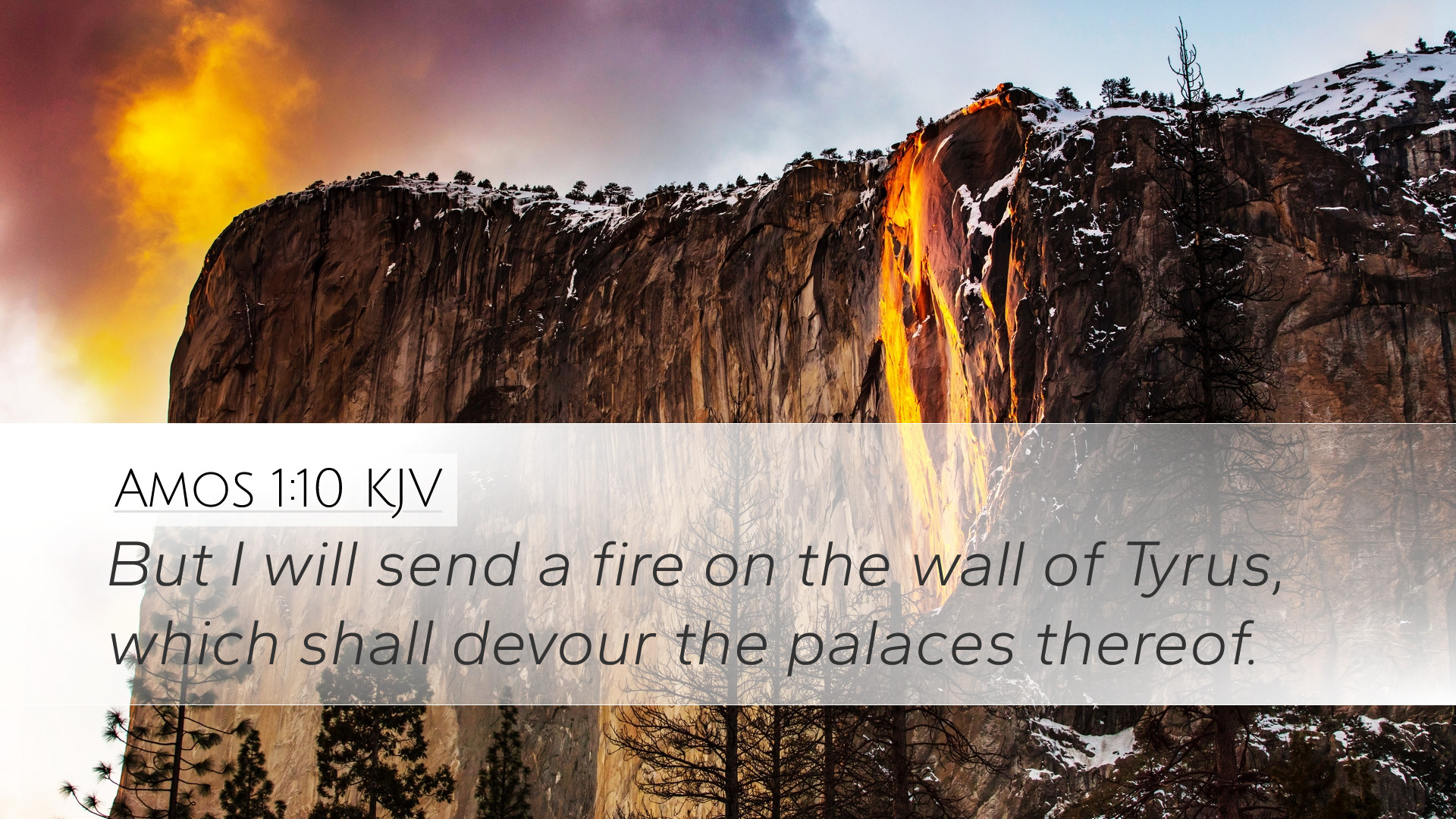Old Testament
Genesis Exodus Leviticus Numbers Deuteronomy Joshua Judges Ruth 1 Samuel 2 Samuel 1 Kings 2 Kings 1 Chronicles 2 Chronicles Ezra Nehemiah Esther Job Psalms Proverbs Ecclesiastes Song of Solomon Isaiah Jeremiah Lamentations Ezekiel Daniel Hosea Joel Amos Obadiah Jonah Micah Nahum Habakkuk Zephaniah Haggai Zechariah MalachiAmos 1:10
Amos 1:10 KJV
But I will send a fire on the wall of Tyrus, which shall devour the palaces thereof.
Amos 1:10 Bible Commentary
Commentary on Amos 1:10
Text of Amos 1:10 (KJV): "But I will send a fire on the wall of Tyrus, which shall devour the palaces thereof."
Introduction
The verse under consideration, Amos 1:10, falls within a series of prophecies against the nations surrounding Israel and Judah. The prophet Amos, a shepherd from Tekoa, delivers these oracles during a time of relative prosperity in Israel, yet spiritual and social decay is prevalent. The judgment against Tyre serves as a poignant reminder of divine justice enacted upon nations that oppress God’s people and ignore covenant faithfulness.
Commentary Insights
General Observations
Amos’ prophecy against Tyre specifically highlights the sins of the Phoenician city, notorious for its trading and maritime prowess. Tyre had not only been an economic powerhouse in the region, but its ties to Israel often involved commercial dealings that lacked moral integrity, especially in the context of slavery and exploitation.
Divine Judgment: The Symbolism of Fire
The imagery of fire in this verse is significant. According to Matthew Henry, fire here symbolizes divine judgement, purging, and destruction, indicating that God will decisively act against Tyre for its iniquities. This serves as a potent metaphor for the complete annihilation of the city’s pride and power.
Albert Barnes also notes that fire represents the consuming nature of God’s wrath. The prophecy foreshadows the Babylonian invasion and the eventual downfall of Tyre, emphasizing that no fortifications can withstand the judgment of God.
The Wall of Tyrus
The wall of Tyre symbolizes its strength and defense. Adam Clarke elaborates that walls in ancient cities were seen as a source of security. By declaring that fire will consume the walls, Amos underscores that even the strongest protections shall fail against God’s will. The fortified city, proud in its defenses, becomes a metaphor for human pride doomed to fall.
Contextual Significance
The condemnation of Tyre is not a stand-alone oracle; it fits within a broader framework of judgment against nations that have engaged in slavery and violence against Israelite people. Matthew Henry emphasizes that Tyre's sin included turning a blind eye to the suffering of Israel during its turbulent times, specifically mentioning their participation in slave trading.
- Rebellion Against Covenant: Tyre’s disregard for the covenant obligations toward Israel led to divine judgment.
- Economic Exploitation: Tyre’s trading practices often extended to exploiting the vulnerable, showing profound moral bankruptcy.
Applicability and Lessons
For pastors, students, and theologians, the implications of Amos 1:10 resonate on multiple levels. First, it serves as a reminder that no nation, regardless of its might or affluence, is beyond God’s reach of judgment. The themes of social justice and ethical living emerge strongly here, urging the faithful to seek righteousness and stewardship in all dealings.
- The Importance of Integrity: This passage calls for an examination of personal and corporate integrity, particularly in matters of economic exchanges.
- God’s Sovereignty: The certainty of divine judgment reinforces the belief that God is sovereign over nations and history.
- Covenant Faithfulness: The need for nations to recognize their responsibilities to God’s people reflects our need to live out our faith in tangible ways, showing mercy and justice.
Conclusion
Amos 1:10 stands as a stark reminder of divine justice against nations committing egregious acts. Using the powerful imagery of fire consuming the walls of Tyre, Amos poignantly illustrates the consequences of betrayal against God’s covenant people. For contemporary readers, the passage is an encouragement to uphold justice, mercy, and integrity, reflecting God’s character in a world often marked by injustice and oppression.


